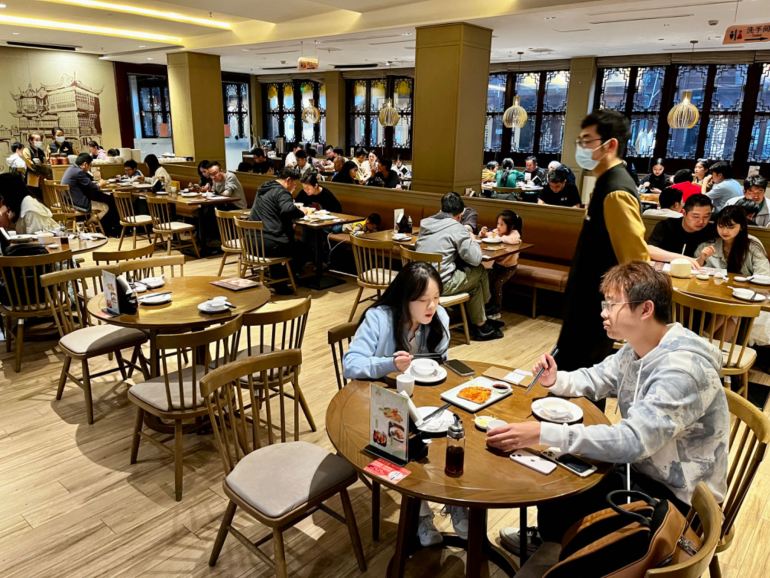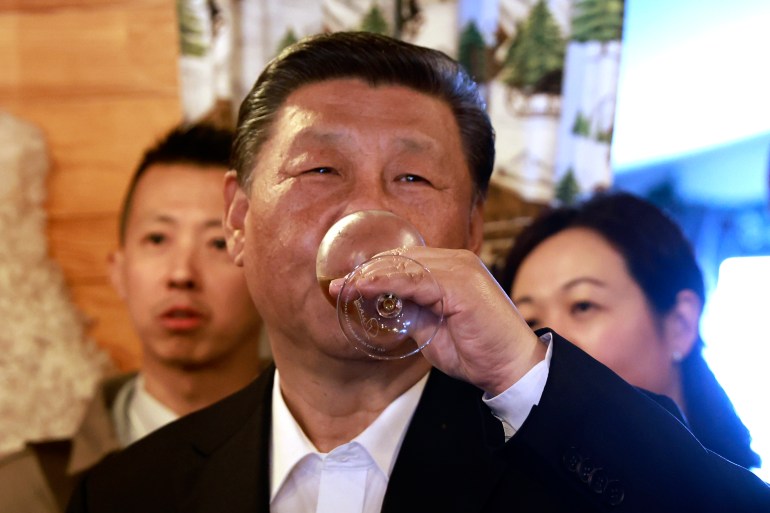Shanghai, China – “The Chinese take great pride in their food,” read a memo prepared for United States President Richard Nixon ahead of his groundbreaking visit to the People’s Republic of China in 1972. Nixon’s lavish state banquet with Chinese premier Zhou Enlai in Beijing, broadcast live across the world, was crucial in improving US public opinion of a country that had been hidden from view for decades.
More than half a century later, food is once again playing a central role in nurturing warmer US-China relations. With Secretary of State Antony Blinken and Treasury Secretary Janet Yellen both recently wrapping up their second visits to China in less than a year, meals have emerged as a key ingredient in stabilising ties between the two countries, as officials on both sides look to tap into the potential of what has been called “food diplomacy”.
Yellen’s visit in early April was notable for the level of Chinese public attention on her food choices. Anticipation was high after her first visit last July, when her choice of a Beijing restaurant serving authentic food from the country’s southern Yunnan province, including mushrooms that can have psychedelic effects if cooked improperly, made her a social media darling in China.
This time around, it was not only her choice of authentic Cantonese and Sichuan food that grabbed headlines but also her use of chopsticks at a popular Guangzhou restaurant established in 1880, reminiscent of Nixon’s own chopstick skills that also impressed his hosts in 1972.
Although Yellen is known to sample local food during her trips around the US, the symbolic significance of doing so in China was especially pronounced, according to Thomas DuBois, a historian of China who teaches at Beijing Normal University.
“In China, food is the language of diplomacy, and the Chinese are rightfully proud of their culinary culture. She [Yellen] knew that how she ate would reflect extremely heavily on her visit,” DuBois told Al Jazeera.
“If you’re eating badly in China, because it’s a very food-obsessed culture, it’s more than a sign of bad taste, it’s a sign that there’s something off about you.”

DuBois noted that one of the common phrases used to describe Yellen’s eating in China was “qianxu”, or humility – a character trait “extremely important” to the Chinese.
“Eating well and knowing how to eat is a profound moral philosophy in China that really comes down to being humble enough to change yourself according to what needs to happen, such as coming here and using chopsticks,” he said.
Food’s importance to diplomacy is well-known among foreign diplomats in China. According to a diplomat for a major European country in Beijing, eating together is one of the top priorities when interacting with Chinese officials.
“In high-level bilateral meetings, it’s incredibly important to have an eating element in the programme because that’s where you can have an open and frank conversation,” he said, preferring not to be named. “The dinners are used strategically on both sides to create a trusted relationship,” he said.
Before the diplomat was posted to Beijing, part of his training related to Chinese banquet customs, including who sits where at the table and the rules surrounding toasting. Ministers from his country are also briefed on these customs before they have meetings with their Chinese counterparts, he added.
Even so, banquets can be tricky affairs. In addition to complicated customs, the complex nature of Chinese cuisine, which uses a wide range of ingredients, can lead to challenges in establishing rapport over food, especially with food allergies, which are relatively uncommon in China.
At a recent banquet in Beijing arranged by the Chinese, each visiting European minister had a different allergy, from lactose intolerance to shellfish.
“A Chinese staffer came over and told me that they had such difficulty planning this dinner for us because our ministers have so many different allergies,” the diplomat said. “These differences in eating habits can complexify things and create lots of stress and anxiety.”
Warm coverage
The viral seven-second video of Yellen’s chopstick skills was first posted by a social media account believed to be run directly by Beijing. Multiple state-run outlets published the full details of Yellen’s food itinerary, including all the dishes she ate.
In an essay on the popular Chinese app WeChat, veteran commentator and former journalist Zhang Feng noted that Chinese state media coverage of Yellen’s more endearing side was a departure from the “cold” reporting on US officials in recent years.
“Yellen’s trip to China may somewhat improve the anti-American sentiment of ordinary Chinese people,” Zhang wrote. Chinese public opinion of the US sharply deteriorated during the Donald Trump presidency, who famously ate “Americanised” Chinese food during his state visit in 2017, rebounding slightly since President Joe Biden took office.
The warmer coverage is consistent with the Chinese state media’s shift in tone on US-China relations in recent months as the Chinese Communist Party (CCP) looks to stabilise bilateral relations amid domestic economic challenges.
The practice has historical roots. Chinese officials also used food to improve perceptions of the US in the run-up to Nixon’s visit in 1972. Photos of Americans friendly to the regime, such as journalist Edgar Snow, attending various state banquets were widely circulated in both national and internal party newspapers.

However, there has also been nationalist pushback against the recent softening of rhetoric.
The outspoken tabloid Global Times said in an editorial that “[t]he Chinese people welcome anyone from anywhere to come and enjoy our food, but that does not mean we won’t push back against groundless accusations and outright crackdowns”.
Another vocal critic, former Xinhua News Agency journalist Ming Jinwei, accused compatriots of being “hopelessly enamoured” with the US in a WeChat essay and referred to them as “spiritual Americans”. He claimed that the reputation of the US is now “bankrupt” in China, which he described as “a good thing”.
The debate over how the CCP should shape domestic opinion towards the US was on display in the much frostier reception Blinken received during his visit in late April, which included meetings with Chinese President Xi Jinping and Foreign Minister Wang Yi.
While Blinken also ate in authentic restaurants in Shanghai and Beijing, with the US embassy even sharing a clip of him with a popular Chinese food vlogger showing off his chopstick skills, his eating habits received far less attention than Yellen’s.
The social media account that had enthused about Yellen’s ability to use chopsticks did not share any videos of Blinken’s culinary adventures. Instead, it emphasised Chinese talking points about the US’s “wrong words and deeds” on various red-line issues at the centre of US-China tensions, including Taiwan, the South China Sea, and Ukraine.
On Weibo, China’s equivalent of X, one of the most discussed topics during Blinken’s three-day visit was an interview with the BBC in Beijing in which he was subject to tough questioning over US support for Israel’s war on Gaza.
The related hashtag for the interview broke into the site’s top 10 most discussed topics on April 28, amassing more than 67 million views as of Tuesday. In contrast, multiple hashtags about Yellen’s eating habits had amassed a total of 39 million views.
It is unclear whether the BBC interview went viral organically. Weibo has been accused of rigging its hashtag ranking system before, with hashtags relating to international politics prone to manipulation.

On Saturday evening, the Shanghai restaurant that Blinken visited was about 80 percent full. A staff member said the restaurant’s location in a tourist hotspot meant that they were always busy and that Blinken’s visit had not led to a spike in customers.
Nonetheless, other countries have also recognised the power of food diplomacy.
On Monday, French President Emmanuel Macron thanked the visiting Xi after an hours-long meeting in Paris for his “openness“ to not imposing preemptive tariffs on French cognac. Beijing had launched an anti-dumping investigation into European brandy in January, viewed by some as a response to a European Union probe on Chinese electric vehicles.
Macron later took Xi and his wife to the Pyrenees, where they nibbled on cheese and enjoyed some wine.
And what did Macron’s going-away gift for Xi include? Two bottles of cognac, of course.

